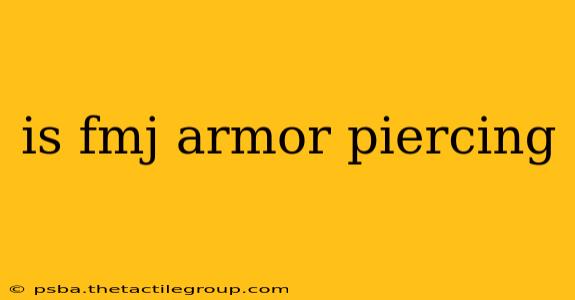The question of whether Full Metal Jacket (FMJ) ammunition is armor-piercing is a complex one, demanding a nuanced answer. The short answer is: not always. While FMJ rounds are often more likely to penetrate than other ammunition types, their armor-piercing capabilities depend heavily on several factors. Let's break down the details.
What is Full Metal Jacket Ammunition?
FMJ ammunition is characterized by a bullet completely encased in a metal jacket, typically made of copper or gilding metal. This jacket protects the lead core, improving accuracy and reducing barrel fouling. The key here is that FMJ itself doesn't inherently define armor-piercing capabilities. The jacket's material and the bullet's construction are what determine penetration.
Factors Affecting Penetration: Caliber, Velocity, and Core Material
Several factors influence whether an FMJ round can penetrate armor:
1. Caliber:
Larger caliber rounds (e.g., .308 Winchester, .50 BMG) generally have a higher mass and kinetic energy, increasing their likelihood of penetrating certain types of armor. Smaller calibers (e.g., .22LR) are less likely to penetrate anything beyond soft targets.
2. Velocity:
Higher bullet velocities translate to greater kinetic energy upon impact. A faster-moving FMJ round will have a better chance of piercing armor compared to a slower one of the same caliber.
3. Core Material:
While many FMJ rounds have a lead core, some may use harder materials like steel or tungsten carbide. These harder cores significantly enhance the armor-piercing potential of the round, even within the same caliber and velocity. These harder core FMJ rounds are often specifically designed for penetration and are not your typical range ammunition.
The Difference Between FMJ and Armor-Piercing (AP) Rounds
It's crucial to differentiate between FMJ and explicitly designed Armor-Piercing (AP) ammunition. AP rounds are specifically engineered to penetrate armor. They frequently feature a hardened steel or other very hard metal core, often with a special design to help them pierce armor plates. An FMJ round might incidentally penetrate some types of relatively thin or weak armor, but it's not its primary design characteristic.
Legal Considerations and Responsible Use
The use of ammunition capable of penetrating armor is subject to significant legal restrictions in many jurisdictions. It is crucial to understand and abide by all applicable laws and regulations concerning the purchase, possession, and use of ammunition. Improper handling or use of any firearm or ammunition can result in serious injury or death.
Conclusion
In summary, whether an FMJ round is "armor-piercing" is contextual and depends on several factors, most notably caliber, velocity, and core material. While some FMJ rounds might penetrate relatively light armor, they are not designed for this purpose. True armor-piercing ammunition is specifically engineered for penetration and is subject to strict regulations. Always prioritize safe and legal handling of all firearms and ammunition.

